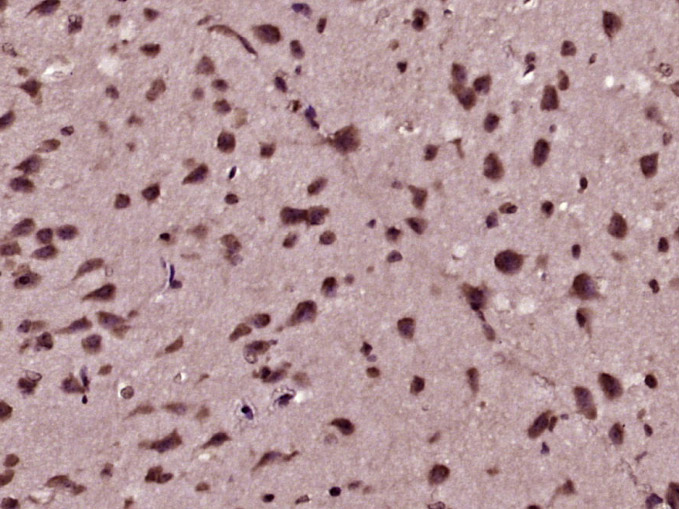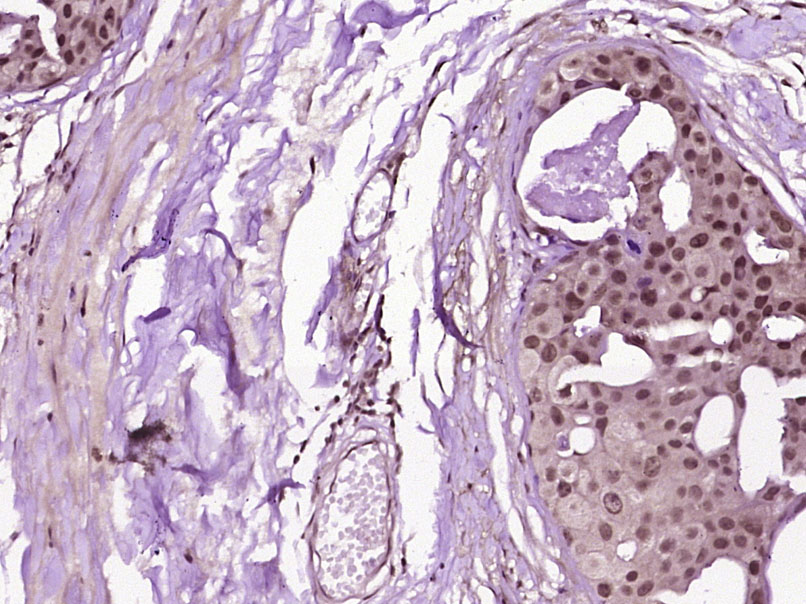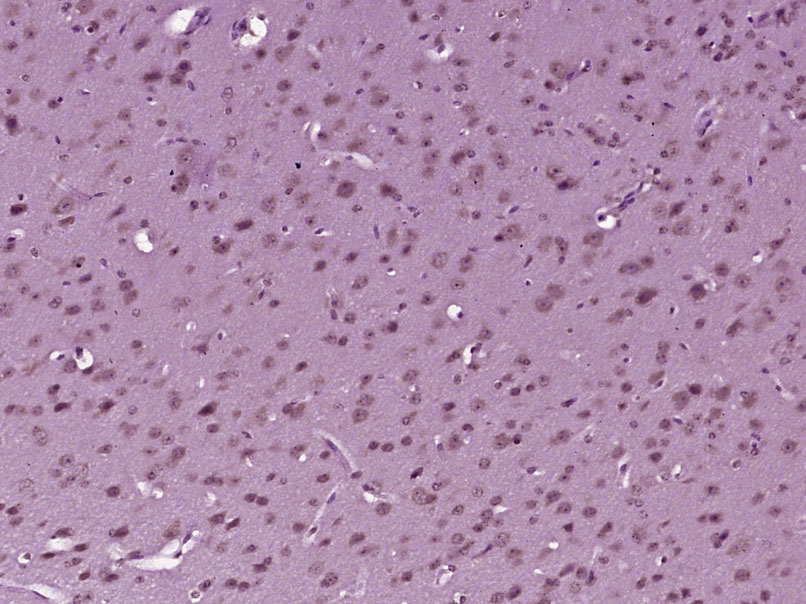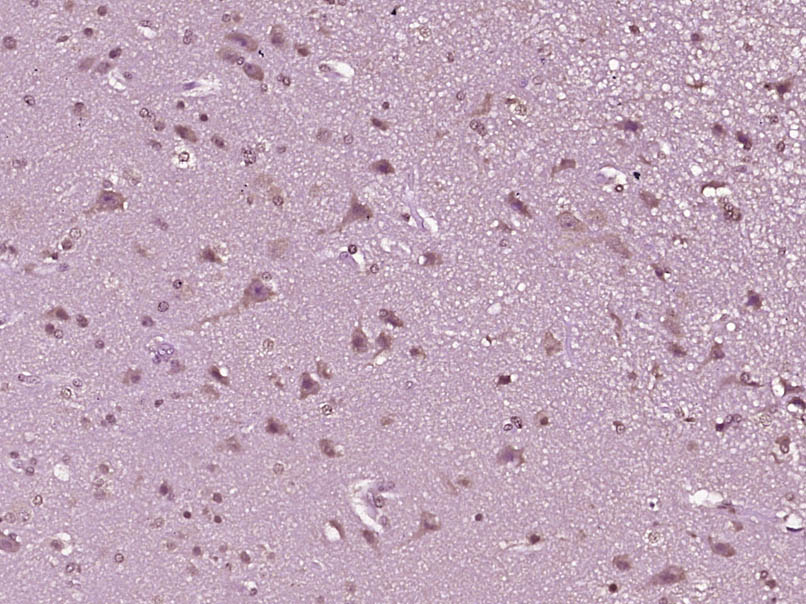
Rabbit Anti-MDM2 antibody
Double minute 2 protein; Hdm 2; HDM2; MDM 2; Mdm2 transformed 3T3 cell double minute 2 p53 binding protein (mouse) binding protein 104kDa; MDM2BP; Mouse Double Minute 2; MTBP; Murine Double Minute Chromosome 2; Oncoprotein Mdm2; p53 Binding Protein Mdm2;
View History [Clear]
Details
Product Name MDM2 Chinese Name 双微体2癌基因抗体 Alias Double minute 2 protein; Hdm 2; HDM2; MDM 2; Mdm2 transformed 3T3 cell double minute 2 p53 binding protein (mouse) binding protein 104kDa; MDM2BP; Mouse Double Minute 2; MTBP; Murine Double Minute Chromosome 2; Oncoprotein Mdm2; p53 Binding Protein Mdm2; Ubiquitin protein ligase E3 Mdm2; MDM2_HUMAN; E3 ubiquitin-protein ligase Mdm2. literatures Research Area Tumour Cell biology Apoptosis Cyclin transcriptional regulatory factor Epigenetics Immunogen Species Rabbit Clonality Polyclonal React Species Human, Mouse, (predicted: Rat, Dog, Pig, ) Applications WB=1:500-2000 ELISA=1:5000-10000 IHC-P=1:100-500 IHC-F=1:100-500 ICC=1:100-500 IF=1:100-500 (Paraffin sections need antigen repair)
not yet tested in other applications.
optimal dilutions/concentrations should be determined by the end user.Theoretical molecular weight 55kDa Cellular localization The nucleus cytoplasmic Form Liquid Concentration 1mg/ml immunogen KLH conjugated synthetic peptide derived from human MDM2 : 401-490/490 Lsotype IgG Purification affinity purified by Protein A Buffer Solution 0.01M TBS(pH7.4) with 1% BSA, 0.03% Proclin300 and 50% Glycerol. Storage Shipped at 4℃. Store at -20 °C for one year. Avoid repeated freeze/thaw cycles. Attention This product as supplied is intended for research use only, not for use in human, therapeutic or diagnostic applications. PubMed PubMed Product Detail Inhibits TP53/p53- and TP73/p73-mediated cell cyclearrest and apoptosis by binding its transcriptional activation domain. Functions as a ubiquitin ligase E3, in the presence of E1 and E2, toward p53 and itself. Permits the nuclear export of p53 and targets it for proteasome-mediated proteolysis. Binds p53, p73, ARF(P14), ribosomal protein L5 and specifically to RNA. Can interact also with retinoblastoma protein(RB), E1A-associated protein EP300 and the E2F1 transcription factor. Forms a ternary complex with TP53/p53 and WWOX. Interacts with CDKN2AIP, MTBP, TRBG1 and USP7. Isoform Mdm2-F does not interact with TP53/p53. Interacts with PYHIN1. Interacts with, and ubiquitinates HIV-1 Tat. Belongs to the MDM2/MDM4 family.
Function:
E3 ubiquitin-protein ligase that mediates ubiquitination of p53/TP53, leading to its degradation by the proteasome. Inhibits p53/TP53- and p73/TP73-mediated cell cycle arrest and apoptosis by binding its transcriptional activation domain. Also acts as an ubiquitin ligase E3 toward itself and ARRB1. Permits the nuclear export of p53/TP53. Promotes proteasome-dependent ubiquitin-independent degradation of retinoblastoma RB1 protein. Inhibits DAXX-mediated apoptosis by inducing its ubiquitination and degradation. Component of the TRIM28/KAP1-MDM2-p53/TP53 complex involved in stabilizing p53/TP53. Also component of the TRIM28/KAP1-ERBB4-MDM2 complex which links growth factor and DNA damage response pathways.
Subcellular Location:
Nucleus, nucleoplasm. Cytoplasm. Nucleus, nucleolus. Expressed predominantly in the nucleoplasm. Interaction with ARF(P14) results in the localization of both proteins to the nucleolus. The nucleolar localization signals in both ARF(P14) and MDM2 may be necessary to allow efficient nucleolar localization of both proteins. Colocalizes with RASSF1 isoform A in the nucleus.
Tissue Specificity:
Ubiquitous. Isoform Mdm2-A, isoform Mdm2-B, isoform Mdm2-C, isoform Mdm2-D, isoform Mdm2-E, isoform Mdm2-F and isoform Mdm2-G are observed in a range of cancers but absent in normal tissues.
Post-translational modifications:
Phosphorylated in response to ionizing radiation in an ATM-dependent manner.
Auto-ubiquitinated; which leads to proteasomal degradation. Deubiquitinated by USP2 leads to its accumulation and increases deubiquitinilation and degradation of p53/TP53. Deubiquitinated by USP7; leading to stabilize it.
DISEASE:
Note=Seems to be amplified in certain tumors (including soft tissue sarcomas, osteosarcomas and gliomas). A higher frequency of splice variants lacking p53 binding domain sequences was found in late-stage and high-grade ovarian and bladder carcinomas. Four of the splice variants show loss of p53 binding.
Similarity:
Belongs to the MDM2/MDM4 family.
Contains 1 RanBP2-type zinc finger.
Contains 1 RING-type zinc finger.
SWISS:
Q00987
Gene ID:
4193
Database links:Entrez Gene: 4193 Human
Entrez Gene: 17246 Mouse
Omim: 164785 Human
SwissProt: Q00987 Human
SwissProt: P23804 Mouse
Unigene: 484551 Human
Unigene: 22670 Mouse
Unigene: 447669 Mouse
Unigene: 91829 Rat
Mdm2基因在Tumour发生、发展的过程中起着重要作用,Mdm2蛋白过度表达与p53基因突变有重要的关联性。Mdm2基因在Tumour发生、发展的过程中起着重要作用。MDM2广泛分布于人体正常组织中,可与p53蛋白相互作用。活化的p53导致MDM2表达,而MDM2的表达又可抑制野生型p53的转录激活作用。MDM2通常在软组织肉瘤中有过表达现象,而在膀胱癌、乳腺癌、宫颈癌、胶质细胞瘤中也有一定程度的表达,并可能与Tumour细胞的耐药有关。Product Picture
References (0)
No References
Bought notes(bought amounts latest0)
No one bought this product
User Comment(Total0User Comment Num)
- No comment






 +86 571 56623320
+86 571 56623320
 +86 18668110335
+86 18668110335

